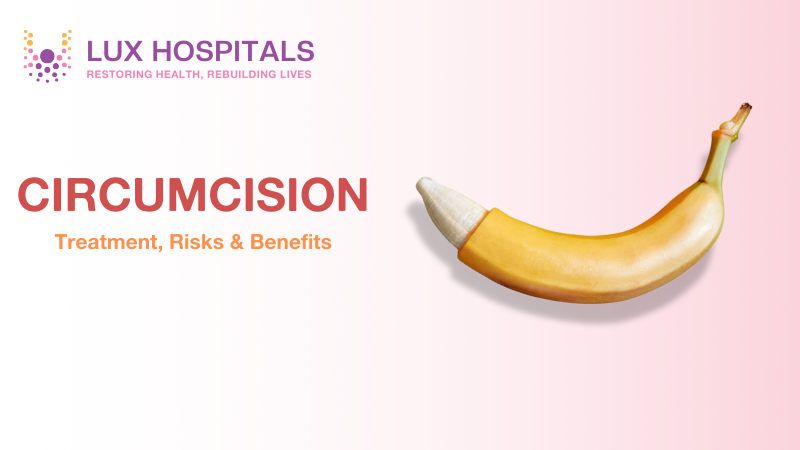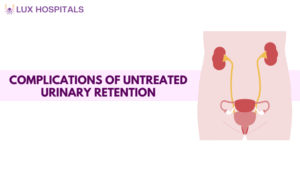Circumcision: Understanding the Procedure, Benefits, and Risks

Circumcision is the surgical removal of the foreskin from the male penis. The practice has been carried out for centuries in many cultures and religions. Many parents and individuals have considered circumcision due to health-related, cultural, or religious reasons. This all-inclusive guide provides information on circumcision, its benefits, risks, and recovery.
What is Circumcision?
A surgical operation known as circumcision can be done on adults, children, or infants. The skin covering the tip of the penis, known as the foreskin, is removed, which is the primary goal of circumcision. Although it is performed mainly for religious or cultural reasons, there are a few health benefits that have contributed to the wide practice of this procedure.
Circumcision Preparation
Preparation for Circumcision
- Consultation: Arrange a consultation with a healthcare provider to discuss the procedure, its benefits, and risks and answer any questions or doubts.
- Medical History: Share with the doctor one’s complete medical history, including allergies or reactions to anesthesia.
- Pre-Procedure Instructions: Follow any specific instructions given by the doctor, such as fasting before the procedure if general anesthesia will be used.
- Mental Preparation: Understand the steps involved and prepare mentally for the surgery and recovery period.
Types of Circumcision
Based on the patient’s age and the medical environment, several circumcision techniques are employed. The following are the most popular techniques:
- Traditional Surgical Circumcision: This involves the use of surgical instruments in the removal of the foreskin. It is mostly performed in a hospital or clinic under local or general anaesthesia.
- Laser Circumcision: This is a modern approach using laser technology to remove the foreskin. Laser circumcision is much preferred because of its precision and less bleeding.
- Plastibell Technique: This is often used for infants; a plastic ring is placed around the foreskin, and it falls off with the excess skin.
- Clamp Methods: The Gomco clamp or Mogen clamp squeezes the foreskin, thereby making it easy to remove. These methods are quick and, in most cases, performed on newborns.
Steps Involved in Circumcision Surgery
Preparation: The patient is prepared, and the Area is cleaned to avoid infection
- Anesthesia: The Anesthesiologist gives the patient either local or general anaesthesia to avoid pain
- Foreskin Removal: The surgeon cuts away the foreskin with the method preferred by the parents.
- Closure: The incision may be closed by sutures or a biological adhesive. A dressing is done.
- PostProcedure: The necessary instructions regarding follow-up care for the patient would be to keep the area clean and watch for signs of infection.
Benefits of Circumcision
Some of the health benefits of circumcision include:
- Reduced risk of Infection: Male circumcision reduces the risk of UTIs in infancy, which will further reduce the risk of acquiring STIs in adulthood.
- Hygiene: The removal of the foreskin makes it simpler to maintain a clean penis. Which reduces the chance of infections and inflammation of the penis.
- Reduced Risk of Penile Cancer: Although not typical, penile cancer is much less common among circumcised males.
- Prevention of Phimosis: Circumcision can prevent or treat phimosis, a condition where the foreskin cannot be retracted over the glans.
- Reduced Risk of Cervical Cancer in Partners: For female partners, circumcision has been linked to a decreased incidence of cervical cancer.
Risks and Considerations
While circumcision has benefits, it is essential to consider the potential risks:
- Pain and Discomfort: Although it can be managed with medicine, the most prevalent fear is pain during and after the procedure.
- Bleeding and Infection: As with any surgical procedure, there are risks of bleeding and infection, although these are very rare when performed by an experienced professional.
- Adverse Reactions to Anesthesia: Some people develop reactions to anesthesia used in the surgery
- Scarring: Minor scarring may occur at the site of circumcision.
- Emotional Impact: Circumcision, especially among older children and adults, carries a psychological impact one must consider.
Circumcision Recovery Time
Recovery from circumcision depends on the age of the patient and the method followed:
- Infants: It takes roughly seven to ten days to recuperate. Keeping the area clean and applying ointment to stop infections are examples of care.
- Children and Adults: It may take 2-3 weeks to recover. Pain and swelling are more pronounced, and patients are cautioned against strenuous activities and sexual intercourse until fully healed.
Tips for a Smooth Recovery
- Post-Operative Instructions: Take good care as advised by your doctor.
- Keep the Area Clean and Dry: This will prevent infection.
- Pain Management: Take your prescribed pain medications to control discomfort.
- Watch for Signs of Complications: Watch for signs of infection—redness, swelling, or discharge—and call your doctor if any occur.
- Avoid Certain Activities: Avoid activities that can put a strain on the Area, such as heavy lifting or sexual activity, until cleared by your doctor.
Circumcision in Different Age Groups
- Newborn Circumcision
Circumcision in newborns is mostly performed within the first few days of birth. It is a rapid procedure with rare complications. Many parents choose newborn circumcision for their child due to cultural, religious, or health reasons.
- Pediatric Circumcision
Circumcision may be indicated in older children for medical reasons, including recurrent infections or phimosis. General anesthesia may be needed for the procedure, and the recovery time may be longer than for babies.
- Adult Circumcision
Adult circumcision is less common however it might be required for personal or medical reasons. The process takes longer to recover from and is more complicated. The patient should talk to their healthcare professional about the possible advantages and disadvantages.
Circumcision and Sexual Health
There has been conflicting data on how circumcision affects sexual health. Despite some research pointing to potential alterations in sensitivity, others have demonstrated that circumcision does not affect sexual performance or satisfaction. It is advisable to discuss any worries regarding circumcision with a medical professional before to the procedure.
Conclusion
Circumcision is a very common procedure with some benefits and a few risks. Knowing the types of circumcision, the procedure, and recovery can enable an individual and parents to make a proper decision. Ultimately, it is essential to consult a qualified health provider in order to determine the best approach for a case, whether it be for medical, cultural, or personal reasons.
This enables them to make informed decisions based on their health needs and personal values while considering all aspects of circumcision, including the benefits, risks, and recovery. Whether using the traditional surgical method or one of the modern techniques, such as laser circumcision, the most critical aspect is ensuring that the procedure is safe and done professionally.
Frequently Asked Questions
Circumcision surgery is a medical procedure that involves the removal of the foreskin, the loose skin covering the head of the penis. It is performed for various reasons, including medical, cultural, or religious purposes.
Circumcision can have health benefits like reduced infection risk but also carries some risks. Whether it is good or bad depends on personal, cultural, or medical reasons.
To prepare for a circumcision procedure, consult with your urology doctor, follow any pre-operative instructions like fasting if required, and arrange for transportation home after the surgery.
Circumcision is generally a highly successful procedure with low rates of complications when performed by a qualified healthcare professional.
Lux Hospitals is known for its advanced facilities and experienced urological professionals. Choosing Lux Hospitals ensures access to advanced surgical techniques, including laser circumcision, personalized patient care, and a comfortable recovery environment.
No, circumcision does not affect fertility. It only involves the removal of the foreskin and has no impact on a man’s ability to father children.




















